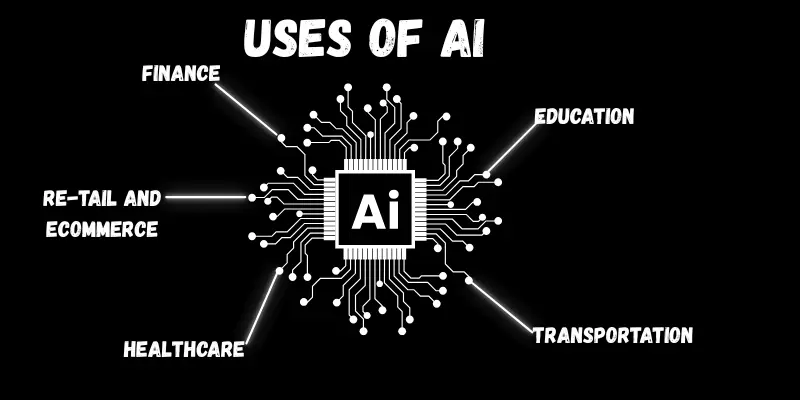Uses of Artificial Intelligence: Simple Guide with Real Examples
Published: 11 Oct 2025
These days, artificial intelligence (AI) plays a big role in our everyday lives. Whether you get YouTube video suggestions, search for directions on Google Maps, or unlock your phone with Face ID, AI is working in the background. Simply put, AI is a technology that allows machines to learn and think like humans. It means machines can make decisions, solve problems, and keep learning over time.
In this article, we will explore the different uses of artificial intelligence that make our lives easier and smarter.
What is Artificial Intelligence
The technology known as artificial intelligence, or AI, allows machines to behave intelligently like people. It facilitates information comprehension, learning, and decision-making for computers and other devices. This implies that machines are capable of speech recognition, language translation, and product or television recommendations.
If you want a detailed explanation, you can read our complete guide on What is Artificial Intelligence.
Without realizing it, you already use AI daily. AI is responsible for everything from Siri answering your inquiries to Netflix suggesting a movie you might enjoy to Google Maps displaying the fastest path. It is intended to simplify our lives by performing activities as fast and precisely as the human brain would.
Why is AI Important in Our Life?
AI is significant because it improves speed, intelligence, and ease of living. It enables us to complete numerous tasks more quickly and accurately. Google Maps’ AI, for instance, provides the quickest route and real-time traffic updates so you can get where you’re going fast. AI in healthcare enables physicians to identify illnesses early and provide more effective therapies.
It enhances our everyday activities as well. AI is used in everything from Face ID phone unlocking to tailored shopping recommendations. AI is used by businesses to better understand their clients, forecast trends, and deliver superior customer service. To put it briefly, AI improves our world’s efficiency and connectivity while also saving time and minimizing errors.

Common Uses of AI in Daily Life
AI is part of our everyday life, even if we don’t always notice it. Here are some common ways you use AI daily:
- Voice Assistants: Tools like Siri, Alexa, and Google Assistant answer questions, set reminders, and control smart home devices.
- Social Media: Platforms such as Instagram and Facebook use AI to show posts, ads, and suggestions based on your interests.
- Online Shopping: When Amazon recommends products you might like, that’s AI working to predict your needs.
- Navigation: AI is used by Waze and Google Maps to provide real-time traffic data and recommend the quickest routes.
- Photo Apps: Face filters, background blur, and automatic image enhancement are just a few of the AI-powered features seen in apps like Instagram and Snapchat.
Uses of AI in Different Industries
Artificial Intelligence has transformed many industries by making processes faster, smarter, and more accurate. Let’s look at some major industries where AI is creating a big impact:
1. Healthcare
AI in healthcare is saving lives. It aids physicians in better patient care and early disease detection. AI systems, for instance, are faster than humans at reading blood tests, MRI images, and X-rays. They are even able to foresee illnesses like cancer or heart issues before they worsen. Because AI-powered robots are extremely accurate and lower the possibility of mistakes, hospitals utilize them for surgery. AI also aids in drug discovery, which is the rapid development of novel medications.
2. Education
AI in education is one of the key uses of artificial intelligence. It makes learning simple and personal. Smart programs adjust lessons based on each student’s speed and understanding. For example, AI gives extra math practice to students who need it. Virtual tutors are available 24/7 to answer questions and explain topics. Teachers also benefit because AI creates study plans and checks homework faster.
3. Finance
In the finance industry, AI is very important for security and planning. Banks use AI to detect fraud by monitoring unusual transactions. It helps protect customers from scams. AI-powered chatbots answer customer queries instantly, like checking account balance or transferring money. In stock markets, AI predicts trends and gives advice for better investment decisions.
4. E-commerce
Artificial intelligence makes online buying easier. When you visit Amazon or Flipkart, you will get product recommendations based on artificial intelligence. It analyzes your previous searches and suggests things you might want to buy. AI can also help with customer service by creating chatbots that address problems quickly. It also manages inventory and delivery systems, allowing for speedier shopping.
5. Transportation
Artificial intelligence has made travel safer and wiser. Self-driving cars employ artificial intelligence to detect the route, traffic, and obstructions. Ride-sharing apps like Uber employ artificial intelligence to connect drivers and passengers and discover the shortest route. Big city traffic management systems utilize artificial intelligence to control signals and eliminate traffic delays. Artificial intelligence is also employed in airplanes for navigation
New & Emerging Uses of AI
AI is not only boosting existing sectors but also developing new methods to aid people and the environment. These applications are still emerging, but they have a significant impact on our future.
1. AI in Mental Health
AI is currently being used to improve mental wellness. Chatbots and virtual therapists can communicate with individuals who are agitated, anxious, or depressed. They offer emotional support and suggestions for feeling better. AI also examines a person’s speech and behavior to detect depressive symptoms early on. This helps doctors and therapists provide better care.
2. AI in Pharmacy
Creating new medicines usually takes years, but AI makes this process faster. AI studies thousands of chemicals and predicts which ones can be used for new drugs. It also helps design personalized medicines for patients based on their health conditions. This means better and safer treatments.
3. AI for Environment
Artificial intelligence is also beneficial to the environment. It monitors air and water pollution levels and forecasts meteorological events such as thunderstorms and floods. AI also helps to cut energy consumption in factories and residences, saving electricity and protecting the environment. Some companies use artificial intelligence to plan green energy projects such as solar and wind power.
Benefits of AI
AI brings many advantages to our daily lives and industries. Here are the key benefits. To explore both sides of the picture, you can read our complete guide on the advantages and disadvantages of AI.
- Saves Time and Effort: AI completes tasks faster than humans. For example, voice assistants like Alexa can send a message, play music, or set a reminder in seconds.
- Reduces Human Errors: Machines do not become tired or distracted. In healthcare, artificial intelligence can accurately assess medical information and assist doctors in avoiding errors.
- Works 24/7: Unlike humans, AI systems can work continuously without taking breaks. Customer support chatbots, for example, are available all day and night to resolve issues quickly.
- Improves Decision Making: AI studies large amounts of data and gives useful insights. Businesses use AI to predict trends and make smart decisions for growth.
- Makes Life Easier: AI improves daily living by providing personalized shopping suggestions and automatic photo editing.
Challenges & Risks of AI
AI is powerful, but it also comes with some problems and dangers that we need to understand:
- Job Loss: AI can perform many of the things that people used to undertake. This means that some positions, particularly those in manufacturing, customer service, and data entry, may be eliminated.
- Privacy Issues: AI collects and analyzes a lot of personal data. If this data is misused or hacked, it can harm people’s privacy and security.
- High Cost: Building and maintaining AI systems is expensive. Small businesses often cannot afford advanced AI solutions.
- Misuse of AI: If AI is employed incorrectly, it might be risky. Deepfake films, for example, or AI-powered hacks, can be extremely disruptive.
- Lack of Human Judgment: AI is smart, but it does not have human emotions or moral values. Sometimes, decisions made by AI can be unfair or unethical.
How to Start Using AI in Your Life?
You don’t need to be a tech expert to use AI. It is already part of many tools and apps that you can start using today. Here are some easy ways:
- Use AI Assistants: Begin with voice assistants, such as Google Assistant, Siri, or Alexa. They can help you make reminders, answer inquiries, and operate your smart home devices.
- Try AI in Daily Apps: AI is used in photo editing apps such as Snapchat, Instagram, and FaceApp to provide filters and enhancements. You can also utilize AI-powered note-taking applications and grammar checkers such as Grammarly.
- Learn from Free AI Tools: ChatGPT, Canva AI, and Google Bard are all platforms that can aid with writing, designing, and idea generation. These tools are simple to use and free for beginners.
- Explore AI in Business: If you run a business, start using AI chatbots for customer service or AI analytics tools to understand your customers better.
- Take AI Courses: Websites like Coursera and Udemy offer free and paid courses to learn AI basics. This will help you understand how AI works and how to use it effectively.
Conclusion
Every day, artificial intelligence is transforming how we interact, work, and live. AI is used in everything from simple things like reminding us to helping doctors save lives. It makes life quicker, easier, and more intelligent.
However, we must use AI with caution. It presents difficulties like misuse, privacy concerns, and loss of employment. AI has the potential to improve, advance, and make the future safer if it is used properly.
AI is a partner that is influencing our environment; it is more than just technology. Are you prepared to take full use of it? AI’s future begins today.
Frequently Asked Questions [FAQs]
Here are some common questions people ask about the uses of Artificial Intelligence. These answers will help you understand AI better.
AI is used in smartphones, voice assistants, online shopping, navigation apps, and social media recommendations.
The most used form of artificial intelligence is machine learning (ML). It is widely used because it allows systems to learn from data and improve over time without being manually programmed. Examples include:
- Voice assistants like Alexa and Siri
- Recommendation systems on Netflix or YouTube
- Spam filters in emails
Self-driving automobiles, intelligent healthcare systems, AI-powered robots, and improved industrial automation are all examples of the future of artificial intelligence.
There are countless uses of AI, but the main ones include:
- Healthcare – disease detection, virtual assistants for patients
- Education – personalized learning, AI tutors
- Business – chatbots, data analysis, fraud detection
- Transportation – self-driving cars, traffic prediction
- Entertainment – movie recommendations, music suggestions
- Security – facial recognition, cybersecurity

- Be Respectful
- Stay Relevant
- Stay Positive
- True Feedback
- Encourage Discussion
- Avoid Spamming
- No Fake News
- Don't Copy-Paste
- No Personal Attacks

- Be Respectful
- Stay Relevant
- Stay Positive
- True Feedback
- Encourage Discussion
- Avoid Spamming
- No Fake News
- Don't Copy-Paste
- No Personal Attacks





